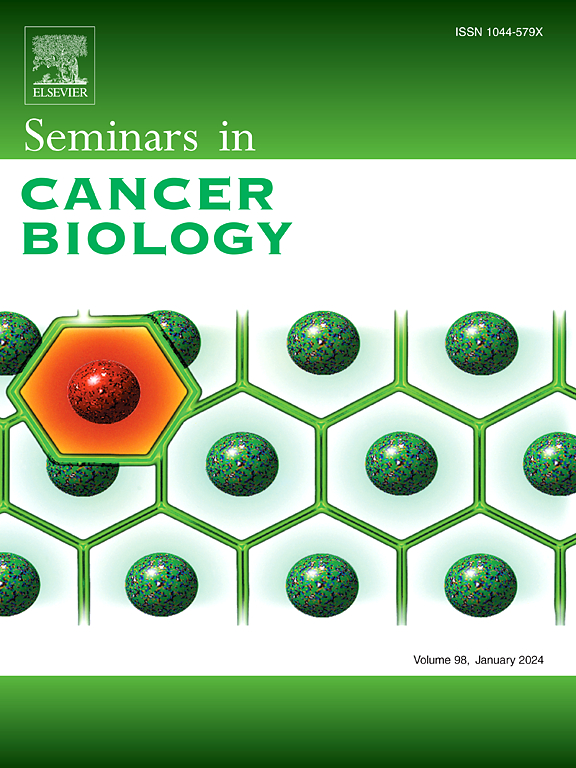Fungi, immunosenescence and cancer
IF 12.1
1区 医学
Q1 ONCOLOGY
引用次数: 0
Abstract
Fungal microbes are a small but immunoreactive component of the human microbiome, which may influence cancer development, progression and therapeutic response. Immunosenescence is a process of immune dysfunction that occurs with aging, including lymphoid organ remodeling, contributing to alterations in the immune system in the elderly, which plays a critical role in many aspects of cancer. There is evidence for the interactions between fungi and immunosenescence in potentially regulating cancer progression and remodeling the tumor microenvironment (TME). In this review, we summarize potential roles of commensal and pathogenic fungi in modulating cancer-associated processes and provide more-detailed discussions on the mechanisms of which fungi affect tumor biology, including local and distant regulation of the TME, modulating antitumor immune responses and interactions with neighboring bacterial commensals. We also delineate the features of immunosenescence and its influence on cancer development and treatment, and highlight the interactions between fungi and immunosenescence in cancer. We discuss the prospects and challenges for harnessing fungi and immunosenescence in cancer diagnosis and/or treatment. Considering the limited understanding and techniques in conducting such research, we also provide our view on how to overcome challenges faced by the exploration of fungi, immunosenescence and their interactions on tumor biology.
真菌、免疫衰老和癌症。
真菌微生物是人类微生物组中一个很小但具有免疫反应性的组成部分,它可能影响癌症的发生、进展和治疗反应。免疫衰老是一种随着年龄增长而发生的免疫功能障碍过程,包括淋巴器官重塑,导致老年人免疫系统的改变,这在癌症的许多方面起着关键作用。有证据表明真菌和免疫衰老之间的相互作用可能调节癌症进展和重塑肿瘤微环境(TME)。在这篇综述中,我们总结了共生真菌和致病真菌在调节癌症相关过程中的潜在作用,并对真菌影响肿瘤生物学的机制进行了更详细的讨论,包括局部和远程调节TME,调节抗肿瘤免疫反应以及与邻近细菌共生菌的相互作用。我们还描述了免疫衰老的特征及其对癌症发展和治疗的影响,并强调了真菌与癌症免疫衰老之间的相互作用。我们讨论了利用真菌和免疫衰老在癌症诊断和/或治疗中的前景和挑战。鉴于开展此类研究的理解和技术有限,我们还就如何克服真菌、免疫衰老及其在肿瘤生物学中的相互作用所面临的挑战提供了我们的观点。
本文章由计算机程序翻译,如有差异,请以英文原文为准。
求助全文
约1分钟内获得全文
求助全文
来源期刊

Seminars in cancer biology
医学-肿瘤学
CiteScore
26.80
自引率
4.10%
发文量
347
审稿时长
15.1 weeks
期刊介绍:
Seminars in Cancer Biology (YSCBI) is a specialized review journal that focuses on the field of molecular oncology. Its primary objective is to keep scientists up-to-date with the latest developments in this field.
The journal adopts a thematic approach, dedicating each issue to an important topic of interest to cancer biologists. These topics cover a range of research areas, including the underlying genetic and molecular causes of cellular transformation and cancer, as well as the molecular basis of potential therapies.
To ensure the highest quality and expertise, every issue is supervised by a guest editor or editors who are internationally recognized experts in the respective field. Each issue features approximately eight to twelve authoritative invited reviews that cover various aspects of the chosen subject area.
The ultimate goal of each issue of YSCBI is to offer a cohesive, easily comprehensible, and engaging overview of the selected topic. The journal strives to provide scientists with a coordinated and lively examination of the latest developments in the field of molecular oncology.
 求助内容:
求助内容: 应助结果提醒方式:
应助结果提醒方式:


